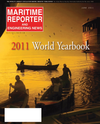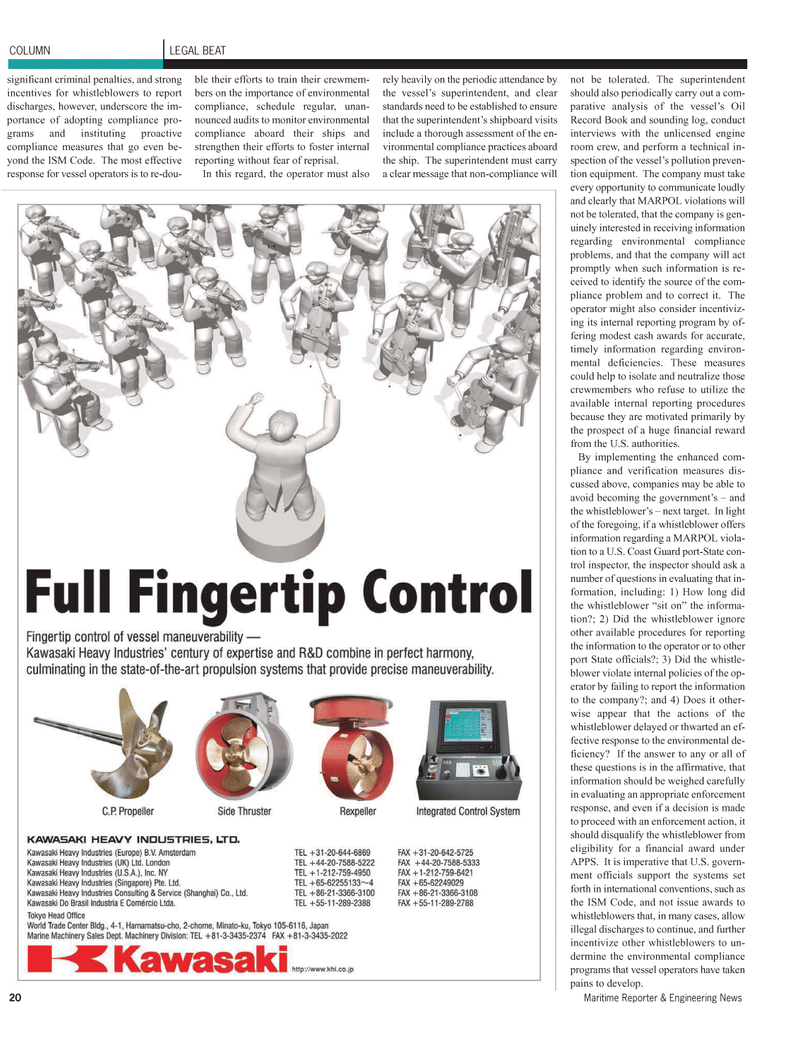
Page 20: of Maritime Reporter Magazine (June 2011)
Feature: Annual World Yearbook
Read this page in Pdf, Flash or Html5 edition of June 2011 Maritime Reporter Magazine
20Maritime Reporter & Engineering News significant criminal penalties, and strong incentives for whistleblowers to report discharges, however, underscore the im- portance of adopting compliance pro-grams and instituting proactive compliance measures that go even be- yond the ISM Code. The most effective response for vessel operators is to re-dou- ble their efforts to train their crewmem- bers on the importance of environmental compliance, schedule regular, unan- nounced audits to monitor environmental compliance aboard their ships andstrengthen their efforts to foster internal reporting without fear of reprisal.In this regard, the operator must also rely heavily on the periodic attendance by the vessels superintendent, and clear standards need to be established to ensurethat the superintendents shipboard visits include a thorough assessment of the en-vironmental compliance practices aboardthe ship. The superintendent must carry a clear message that non-compliance willnot be tolerated. The superintendent should also periodically carry out a com-parative analysis of the vessels Oil Record Book and sounding log, conductinterviews with the unlicensed engine room crew, and perform a technical in- spection of the vessels pollution preven- tion equipment. The company must take every opportunity to communicate loudly and clearly that MARPOL violations willnot be tolerated, that the company is gen- uinely interested in receiving information regarding environmental compliance problems, and that the company will act promptly when such information is re-ceived to identify the source of the com- pliance problem and to correct it. The operator might also consider incentiviz- ing its internal reporting program by of-fering modest cash awards for accurate, timely information regarding environ- mental deficiencies. These measures could help to isolate and neutralize those crewmembers who refuse to utilize the available internal reporting procedures because they are motivated primarily by the prospect of a huge financial reward from the U.S. authorities.By implementing the enhanced com-pliance and verification measures dis- cussed above, companies may be able to avoid becoming the governments ? and the whistleblowers ? next target. In light of the foregoing, if a whistleblower offers information regarding a MARPOL viola- tion to a U.S. Coast Guard port-State con-trol inspector, the inspector should ask a number of questions in evaluating that in- formation, including: 1) How long did the whistleblower sit on? the informa- tion?; 2) Did the whistleblower ignore other available procedures for reporting the information to the operator or to otherport State officials?; 3) Did the whistle- blower violate internal policies of the op- erator by failing to report the information to the company?; and 4) Does it other- wise appear that the actions of thewhistleblower delayed or thwarted an ef- fective response to the environmental de- ficiency? If the answer to any or all of these questions is in the affirmative, that information should be weighed carefullyin evaluating an appropriate enforcement response, and even if a decision is made to proceed with an enforcement action, itshould disqualify the whistleblower from eligibility for a financial award under APPS. It is imperative that U.S. govern- ment officials support the systems set forth in international conventions, such as the ISM Code, and not issue awards to whistleblowers that, in many cases, allow illegal discharges to continue, and further incentivize other whistleblowers to un- dermine the environmental compliance programs that vessel operators have taken pains to develop. COLUMNLEGAL BEAT

 19
19

 21
21
